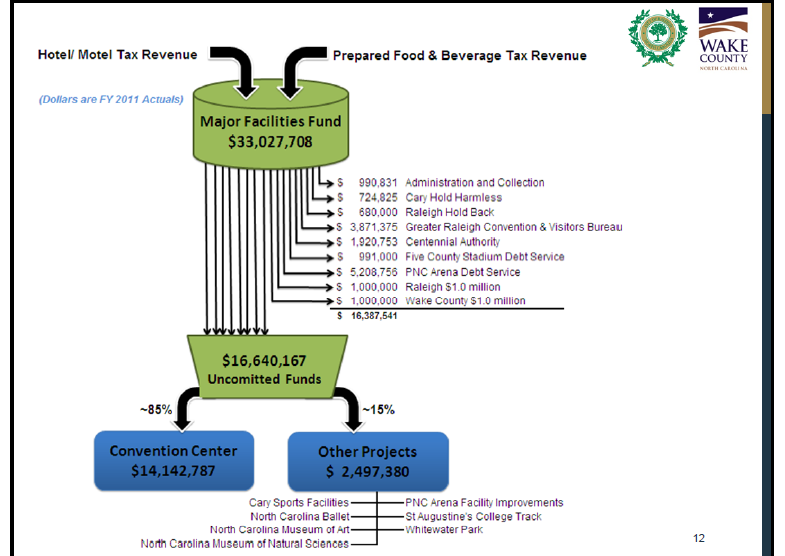Wake County commissioners and Raleigh city councilors approved some changes to the interlocal agreement that dictates what is done with the revenue from hotel and prepared food and beverage taxes at a joint meeting on Thursday.

Click image for a larger version. Image courtesy of Wake County.
In 2011 the taxes alone generated about $33 million. About half of that revenue is portioned out to the Greater Raleigh Convention and Visitors Bureau, the Centennial Authority, and debt service for the Five County Stadium and PNC Arena, among others.
The city and Wake County also take a $1 million cut.
A large portion of what’s left, 85 percent, goes right into the Raleigh Convention Center.
The remaining 15 percent is committed to the NC Museum of Art, NC Ballet, NC Museum of Natural Sciences Green Square Project, Town of Cary Sports Facilities, the St. Augustine’s College track, the Whitewater Park and PNC Arena facility improvements.
City Manager Russell Allen and County Manager David Cooke recommended some small changes to the financial plan, none of which require a tax increase.
The group removed money that was allocated to fund a future convention center expansion starting in 2017. The $121 million was then moved to the fund balance. Cooke said that the money was set aside for an expansion that no one really agreed upon. By keeping the money in that fund, it implied that there would be a future expansion.
Allen said that the city did purchase land in the area with the intent to eventually expand the center, but that a decision by both commissioners and councilors would be required to go forward.
The managers also recommend going forward with a Raleigh Convention Center and Capital Maintenance Plan that was created by a consultant. But only 95 percent of the plan would be funded.
“I think we all now understand what a powerful economic engine the combination of the Raleigh Convention Center and the PNC Arena is,” said City Attorney Thomas McCormick who was speaking on behalf of the Centennial Authority.
According to the agreement, when Raleigh withdraws funds, Wake County gets double. Currently, the county is owed $6 million. Under the new amendment, a $5.4 million transfer would be made to the county.
A business development fund was created through a previous amendment and is run by the Greater Raleigh Convention and Visitors Bureau. The fund has been extended for the next 10 years at $450,000 per year.
Going forward, the managers set fund balance limits extending until 2017. If the actual fund balance exceeds those amounts, the additional funds would be used to fulfill any new or existing two-for-one obligation with the county or any other funding commitments. The Centennial Authority would also receive an additional $500,000 per year.
City councilors approved the amendment and the plan with very little discussion. But the same couldn’t be said for the county commissioners who had questions about revenue projections, debt service and project commitments.
“Why can’t we pay down the debt service and limit the time we owe this thing,” said Commissioner Phil Matthews.
Allen explained that the interest rates for the loans are extremely low. “There’s not a huge advantage to paying off the debt,” he said. But, he added, staff could look into paying down the debt if that’s what the boards wanted.
Matthews and commission chair Paul Coble questioned why the whitewater rafting park continues to be funded, but doesn’t seem to be anywhere near the start of the project.
The money, Coble said, could be used for other projects that could begin generating revenue more quickly. He added that he wanted to give the park developers until the end of 2013 for a status update.
But, commissioners agreed to approve the plan and instruct city staff to meet with the park developers to find out where funding and construction plans stand.
